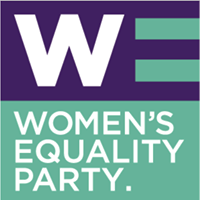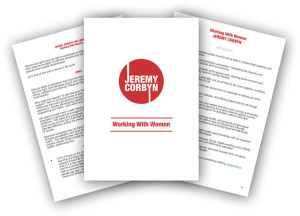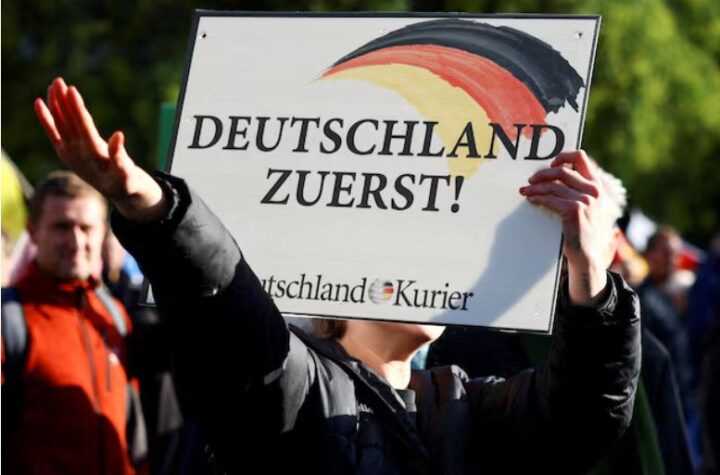
In his first week as Leader of the Labour Party Jeremy Corbyn was first lauded for appointing a shadow cabinet with women in the majority; then lambasted for not appointing women to any of the supposed ‘top four’ shadow posts. So what is Corbyn: feminist or misogynist? We’re clearly in need of a ‘decider’ to clinch the issue – and I think I’ve found it.

The Women’s Equality Party (WEP), launched this March by broadcaster Sandi Toksvig, have published Objectives and invited members of the other parties ‘across the political spectrum’ to sign up if they endorse them.
In order to see how the Labour Party, and in particular Corbyn, measures up to the goals of the WEP, and to compare them with the other parties, I scoured the websites – including ‘women’s sections’ where these existed – and the 2015 manifestos, of:
My ‘headline findings’ are easily summarised:
.
The Conservative Party has three policies resembling WEP objectives:
‘equal pay and an equal opportunity to thrive’;
‘an end to violence against women’; ‘
equal parenting and care-giving and shared responsibilities at home …’
The Lib Dems, the Green Party, the SNP, Plaid Cymru and Labour have four policies resembling the WEP’s objectives: the three supported by the Conservatives (see above) plus
‘equal education – a system that creates opportunities for all children and an understanding of why that matters.’
UKIP has no policies resembling WEP objectives.
None of the parties has a policy relating to the WEP’s objective of
‘equal treatment of women by and in the media’.
Which leaves for discussion the two WEP ‘equal representation’ objectives:
‘equal representation in business, industry and throughout working life’;
and ‘equal representation in politics’.
UKIP and The Conservative Party have no policies on equal representation of women in any area of life.
There is a ‘women’s section’ in the Conservative Party – ‘The Conservative Women’s Organisation’ (CWO). But the organisation does not seem to campaign on equal representation and its ‘Chairman’ (sic), Niki Molnar, reassures new members: ‘We are not feminists …’
The ‘progressive’ parties, as expected, are in general more sympathetic to the principle underlying ‘equal representation in business, industry and throughout working life’, although the commitment tends to fall short of 50/50 representation.
The Liberal Democrat Party go for ‘at least 30% of board members being women’.
The Green Party want ‘boards of major companies (to be) at least 40% female’.
Plaid Cymru believe ‘all government funded bodies (should) include at least 40% membership of both men and women on their management board’ (but do not identify the gender of the remaining 20 %!).
The Labour Party is for ‘strengthening the representation of women … in public life’ but this, of course, falls short of a commitment to 50/50.
The SNP alone lines-up with the WEP‘s objective, promising to ‘take forward proposals to ensure 50 per cent female representation on public boards’.
The WEP’s other ‘equal representation’ objective, and top of their list, is ‘equal representation in politics’. They don’t spell it out, but I assume WEP mean equal representation of women in Parliament.
None of the other political parties has this as an objective, so what I looked for was commitment to equal representation of women in the respective parliamentary parties … and was shocked to find that no such commitment exists on the part of the Lib Dems, the SNP or Plaid Cymru.
The Labour Party aims to ‘achieve a better balance in Parliament, including through the use of all-women shortlists in Labour Party parliamentary selection contests’. But ‘a better balance’ again falls short of a commitment to 50/50.
Only the Green Party is committed ‘to work towards the proportion of female candidates reaching … at least 50% of General Election candidates’.
The Labour Women’s Network campaigns within the Labour Party and argues for 50/50 representation of men and women in the Parliamentary Labour Party. Their lobbying during the leadership election included, towards the end of the hustings, getting the four contenders to pledge support for equal representation in the PLP. But Corbyn’s ‘Working with Women’ policy paper had already made his own commitment on this clear: ‘Women are now 40% of our MPs in the Commons – and we must get that to 50%.’
http://www.jeremyforlabour.com/working_with_women
So far as I can discover, Corbyn was the only candidate to publish a gender equality policy paper as part of his leadership bid, as well as being the only candidate to have argued that there should be equal representation of men and women in the PLP before the group sign-up to the LWN pledge.
All of which shows, I think, that Corbyn comes very close to passing the WEP test: he is much more a feminist than a misogynist! Which is just as well, given the work needed on Labour’s gender equality policies: for example, the Party’s current commitment to ‘strengthening the representation of women … in public life’ surely needs upgrading to a commitment to aim at genuine (i.e. 50/50) equal representation of women in public life? And the Party’s current commitment to seeking ‘a better balance’ between men and women in the PLP should surely be replaced with a commitment to achieving 50/50 representation in the parliamentary party?
And finally, there’s the issue of achieving equal representation across parliament as a whole. Other countries have achieved this in different ways, for example Rwanda, Bolivia and Cuba (see http://www.ipu.org/wmn-e/classif.htm).
Here in the UK it will take a new Representation of the People’s Act. Doubtless the Women’s Equality Party are already busy drafting it. In which case, in this instance, perhaps Corbyn could just ask to be copied in? Really, he has enough on his own plate, for the moment.
John Wright




Whilst I agree that there should be equal opportunity for women, I’m not a fan of arbitrary ratios. If there were for example one fifth the female applicants to stand compared to the males, there’s a very good chance that by having that as a 50/50 ratio that you’re not going to be choosing the best candidates. Equally it gives a genuine voice to those who would complain about hindrances to men for in the name of equality but actually firmly in the positive discrimination camp.
If there is a reason that there are fewer women in politics or standing to be an MP then by all means we should look into why, whether that’s detrimental to politics and what can be done to change it.
I’m not a fan of ratios either and often find the discussion around such targets to be pretty toxic at grass roots left wing organisations. Its a clumsy tool for a pretty dire situation is the best that could be said for it. hopefully we’ll outgrow the need for such things in the future.
We’re not going to outgrow it anytime soon: the Fawcett Society estimates that at the present rate of progress it will take Labour 20 years to get to 50% female candidates, the Lib Dems 40 years and the Tories 400. A dire situation, I agree, but it can’t be justified solely because the only tool which can address it is ‘clumsy’. I support women-only short-lists not because they have intrinsic merit but because they are a step towards the goal of equal representation of women in parliament. Along with the Women’s Equality Party I believe this would be good for everyone – men and women – on the basis of the improved ‘governance’ which equal representation of women would help ensure. This is not an argument for equal representation as a fair and desirable end in itself (though it is), rather it’s an argument for enhanced governance – which is desperately needed, nationally and globally.
The challenge for those opposed to quotas and short-lists, it seems to me, is to either come up with reasons why it is not desirable for there to be equal representation of women in the governance of a society in which they are numerically more than equally represented; or, to come up with alternative means of achieving equal representation without the use of quotas. For example, the Green Party selected 36 women and 37 men to contest the full set of London constituencies in May’s General Election without the use of women only shortlists; the party’s constitution prevents top-down rulings as to how local members elect their candidates. Instead, there was a concerted effort to ensure gender balance amongst candidates; and women members were actively encouraged to stand. No quotas, no short-lists – but it still required a commitment to achieving equal representation and a preparedness to actively work towards it.
There is something about this narrative that I struggle with.
I think its because I don’t have a firm enough grasp of why gender inequality happens and I resist the notion of women as victims.
So I feel I should agree with everything you say John – but it has been my repeated experience that some of the women who champion lists and quotas within grass roots socialist movements are amongst the most shrill and aggressive people you could ever meet.
a debate on this topic at a Left Unity gathering had men trying to make points of basic maths shouted down and had me heading for the exit.
Women are over represented at political gatherings in Stroud while strong male voices are frowned at.
I remain confused on this topic.